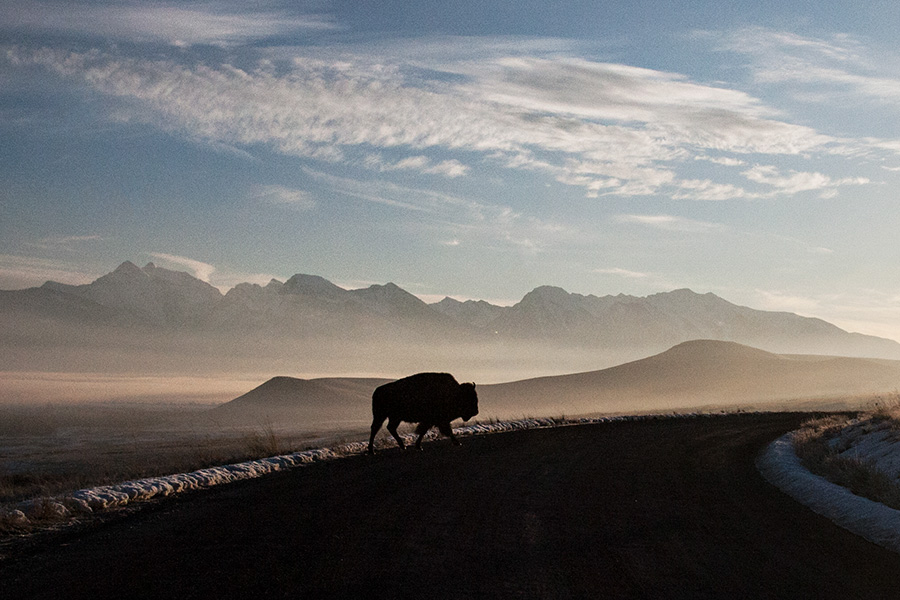Proposal for Future Bison Range Management Does Not Include Transfer to Tribes
Confederated Salish and Kootenai Tribes have been pursuing federal trust ownership of range for 25 years
By Tristan Scott
Federal wildlife officials will not consider transferring ownership of the National Bison Range to the Confederated Salish and Kootenai Tribes under a proposed suite of management options unveiled Thursday, which will ultimately shape the future of the 18,800-acre parcel situated entirely within the Flathead Indian Reservation’s boundaries.
The U.S. Fish and Wildlife (FWS) on April 4 released an Environmental Impact Statement prepared as part of its Comprehensive Conservation Plan for the National Bison Range, a dizzying process that has been beset with controversy as the tribes continue their efforts to assume full management responsibilities of the federal unit that is home to several hundred head of bison.
The agency’s draft proposal will ultimately guide management for the next 15 to 20 years, and while it does consider “collaborative, cooperative, and coordinated management of the National Bison Range with our federal, Tribal, state, local, public, and private partners,” it stops short of fulfilling the Confederated Salish and Kootenai’s (CSKT) requests to restore full management authority to the tribes — efforts that date back a quarter-century, even as their connection to the bison runs much deeper.
A complex narrative has swirled around the bison range, its management authority and the tribes’ involvement since the land was carved from the heart of the Flathead Indian Reservation more than a century ago.
In 1908, the Flathead Indian Reservation ceded control of the land when the federal government established the National Bison Range in the Mission Valley, and returning management authority to the tribes — which would require legislative action — has long been a goal of the CSKT.
In 2016, talks about a transfer plan began in earnest between the FWS and tribal leaders when federal officials broached the topic. The talks marked a departure from the federal agency’s past commitment to maintaining a measure of control of the refuge. If a transfer is finalized, it will effectively end more than a century of FWS management of the Bison Range, removing it from the National Wildlife Refuge System.
The CSKT have released a draft proposal that would place the range back into federal trust ownership for the tribes, which tribal leaders said includes management for bison conservation purposes as well as continued public access.
Those discussions were derailed when the group Public Employees for Environmental Responsibility (PEER), which has adamantly opposed tribal involvement at the Bison Range, filed a lawsuit against FWS, arguing that the federal agency failed to conduct the necessary environmental review before telling CSKT that it would support legislation to transfer the wildlife refuge to the tribes.
As the federal agency worked to craft a Comprehensive Conservation Plan for the bison range, tribal leaders renewed their call to restore ownership of the bison range in earnest.
On March 20, CSKT leaders announced they “would like to revisit the proposal to restore the National Bison Range to federal trust ownership for the benefit of the Tribes. This was the status of the Bison Range lands under the Hellgate Treaty, prior to the creation of the Range.”
“We continue to believe that restoration of the Bison Range to federal trust ownership for the Tribes is the best solution,” Tribal Chairman Ronald Trahan stated in a news release. “It is also historically just. The Tribes work hard as natural resource and wildlife managers and we look forward to extending our work at the Bison Range.”
Under the draft legislation CSKT released for public comment in the summer of 2016, public access would be statutorily required, as would the continued management for bison conservation.
Still, the FWS’ plan does not examine the possibility of a transfer to CSKT even as its preferred alternative states the agency “would explore opportunities to cooperate with CSKT on bison conservation and management.”
Brian Upton, an attorney for the tribes, said the outcome of the federal agency’s planning process will not disrupt CSKT’s plans from pursuing placement of the range into federal trust ownership.
The draft comprehensive conservation plan is available for review at https://www.fws.gov/mountain-prairie/refuges/nbrc.php, and open to public comment until May 20.
FWS will also hold three public meetings on the draft Comprehensive Conservation Plan and Environmental Impact Statement.
Information about each meeting is detailed below:
Date: April 30
Time: 5 p.m. – 8 p.m.
Location: Missoula Public Library
Address: 301 E Main St., Missoula
Venue Phone: (406) 721-2665
________________________
Date: May 1
Time: 5 p.m. – 8 p.m.
Location: Red Lion Inn
Address: 209 Ridgewater Dr., Polson
Venue Phone: (406) 872-2200
________________________
Date: May 2
Time: 5 p.m. – 8 p.m.
Location: National Bison Range Visitor Center
Address: 58355 Bison Range Rd., Charlo
Venue Phone: (406) 644-2211